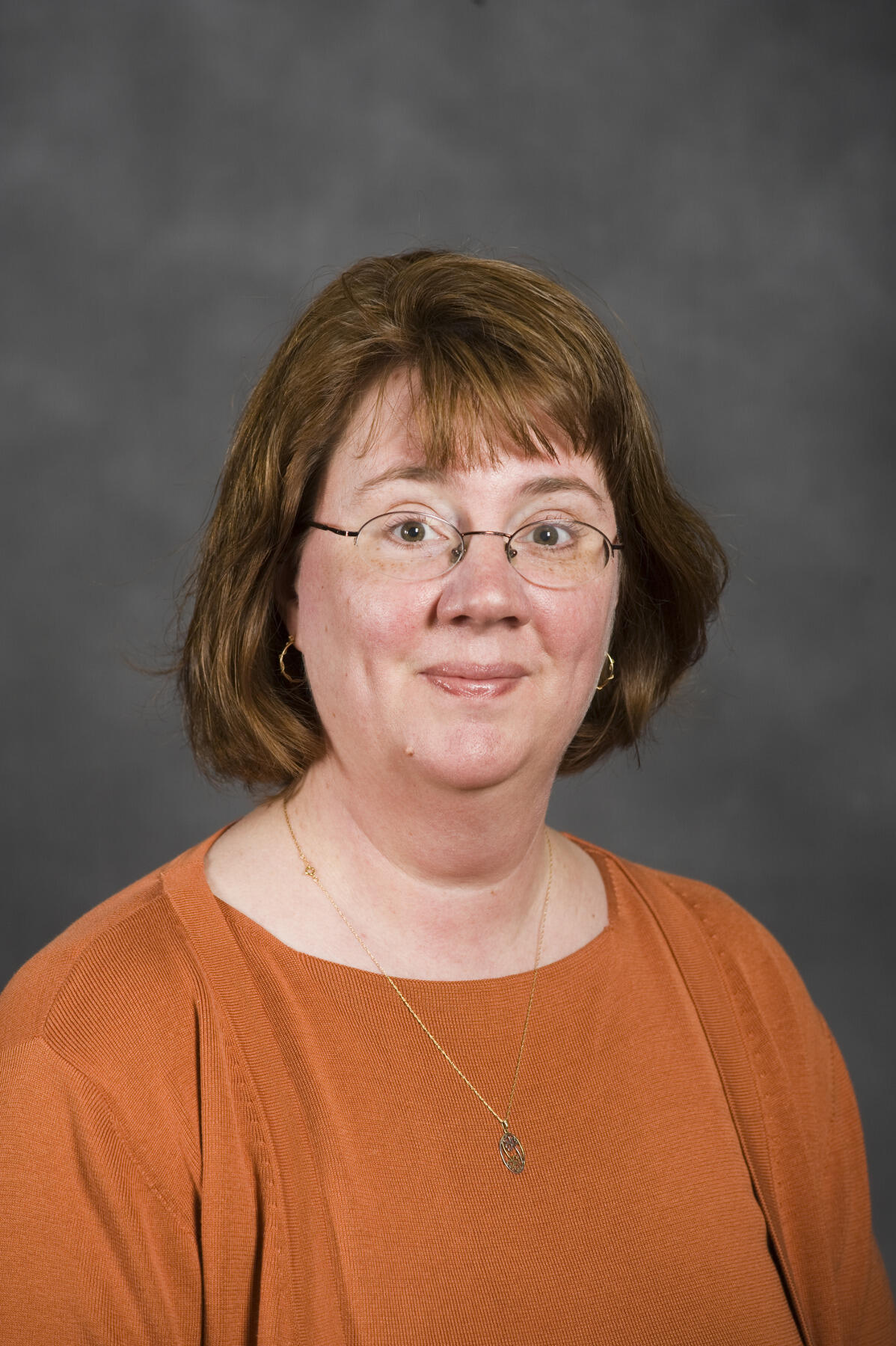
Sept. 19, 2016
‘Everything a good professor should be’
Students can’t take notes on a laptop during Pam Burch’s business statistics class. They organize animal crackers by dietary preference. And they wouldn’t have it any other way.
Share this story
It’s the third week of the semester and Pam Burch already knows all 170 of her students by name.
Senior Austin Flagg is pleasantly surprised, although by now he probably shouldn’t be. Even though the class has only met a handful of times, it has already presented one surprise after another. For example, on the first day Flagg was surprised to find the class playing Operation, the child’s game that tests coordination and motor skills. Not something he expected in a business statistics course.
Today, Burch — term faculty in the School of Business — brings out her BB bucket and plays a clip from “The Price is Right.” The bucket contains about 14,000 BBs of three different colors. Burch does not rely on games and videos so she can do as little work as possible. It’s quite the opposite. She goes an extra mile beyond the extra mile to motivate her students.
“I try to do as many experiments as I can because it’s more interesting than watching me do stuff on the board,” she said.
Plus, she wants her students to experience the collection of data. She uses the BB bucket to teach confidence intervals. Students use paddles with BB-sized crevices to scoop up the pellets, from which they then try to estimate what proportion of the BBs are a certain color.
“We don’t want to go through and count them all,” Burch said. “That's typical of any statistics. You’ve got this huge population you want to know something about. So we use this to draw a sample and from that try to guesstimate what’s in the whole bucket.”
If Flagg hasn’t realized it yet, he’s in for an even bigger surprise: Statistics is fun.

There’s the cookie experiment — not to be confused with the animal cracker experiment — the gum-chewing experiment, the birthday paradox, the paper towel experiment and, of course, the Operation experiment. Burch tries to add new ones each year.
“The goal of the [Operation] experiment was to see if people that were right- or left-handed were better at playing the children’s game,” said Timothy Welby, who took Burch’s class last semester. “It was fun to play a game that almost everyone in the class played as a kid, but also learn the value of the data that can come out of an observation.”
The data collected during the experiments is both categorical and quantitative and is used throughout the semester. When looking at categorical data, one of the things students test is the proportion of successful operations. Then they test the proportion of men and women’s successes. Later in the semester, they use Operation data in a chi-squared test to determine if all the body parts are equally difficult to remove.
In the cookie experiment, students tasted three different chocolate chip cookies and noted their favorite to see if there was a classwide preference. This type of hands-on technique helped Chris Tiller understand the course content better.
“The evaluation made sense, I enjoyed it and completely understood it,” he said.
The unconventional experiments help students remember. A month after learning the chi-squared test using the animal cracker experiment — wherein they count the number of herbivores versus carnivores among other data — many students need a reminder of when to use the test. If Burch told them to recall a homework assignment from several weeks ago, most wouldn't be able to. But if she says, “‘Remember the animal crackers.’ Boom. They’re right there with me.”
Thanks to Burch, Connie Tran “discovered a hidden talent for statistics” even though at first she dreaded taking the required class. Tran’s high school AP Statistics teacher only taught through textbook problems.
“She never went over the problems, since she gave us the answers,” Tran said. “She always said, ‘That’s how you're going to have to learn in college,’ so when I knew I had to retake statistics, I dreaded it.”
But Tran quickly found Burch’s teaching style motivated her to come to class and succeed.
“I've never been so motivated to learn before,” Tran said. “I enjoyed SCMA301 with Mrs. Burch so much that I made sure to take her again for SCMA302. The class was full for months but I checked for open spots every day until I got in.”
Even though Burch bans electronics from class — requiring students to take notes by hand and submit written homework — Alexandra Nuckols never felt like she was wasting her time. Like Tran, Burch’s desire for her students to do well motivated Nuckols to be the best that she could be in statistics.
She is everything a good professor should be — attentive, caring, straightforward and hands on.
“I don’t think I can put into words how much it meant to me that Mrs. Burch was always so willing to help,” Nuckols said. “She is everything a good professor should be — attentive, caring, straightforward and hands on.”
During the first couple of days of class, Burch asks her students to write down some things about themselves. For example, Flagg wrote that he was an avid video gamer for 20 years who built his own car. When it comes time to study descriptive statistics where the students have to present their data, Burch will try to find data to pair with each of their interests.
“Last semester I had two guys that were in the bass fishing club, so I got them data on bass fish,” she said. “If they’re New England Patriots fans, I get them data on that. I had two baseball players, so both their datasets were on Division I baseball.
“Believe me, it takes me forever. … But I do my best to try to make it something they’re interested in.”
Not only do her students have fun and do well, many who are “not statistically savvy,” as Tiller describes himself, actually end up liking statistics by the end of the semester.
“Professor Burch has been, by far, the best professor I’ve ever had,” he said. “I even ended up enjoying the class.”
Flagg already is thoroughly enjoying the class. He can’t wait to see what Burch has up her sleeve next.
“She’s a very individualized teacher and it shows,” he said. “I look forward to the rest of Stats 2.”
Subscribe for free to the weekly VCU News email newsletter at http://newsletter.news.vcu.edu/ and receive a selection of stories, videos, photos, news clips and event listings in your inbox every Thursday.
Subscribe to VCU News
Subscribe to VCU News at newsletter.vcu.edu and receive a selection of stories, videos, photos, news clips and event listings in your inbox.












